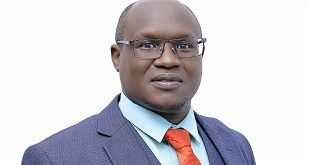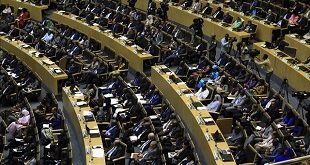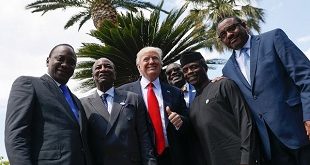
By Haggai Matsiko
FDC President, Mugisha Muntu spoke to The Independent’s Haggai Matsiko about his party’s road map.
You launched a campaign for free and fair elections, previously, we have had these campaigns but they haven’t achieved what was intended, why do you think it is going to be different this time?
Some progress was made; it was not a total failure. Some amendments were done. The problem then was of course impunity as I believe it will continue now depending on whether we are able to mobilise popular feelings against impunity. If we are able to mobilise enough people in this country to resist impunity then we can also see change in that respect.
Our effort right now even operating in this kind of environment is to ensure that we work together as the opposition with civil society, present a common voice, clarify to the population the dangers this country faces if we do not change the direction and we intend therefore to continue with the efforts we have embarked on, we have so far finished with Kampala, we have been in Jinja, the other day was Mbarara and then Masaka, we are going to continue until we go around the whole country and build pressure that can be exerted on the regime for reforms to be done.
I understand you have been doing a lot of mobilisation, extending the frontiers of FDC, how is that going?
The situation largely is in our favour as the opposition because one, 42% of the voting population never voted, that is a huge voting population. Even of those that voted the movement more and more are getting disenchanted. I think more and more people are getting worried, I think, if they see the direction the country is taking. So it is an opportune time for us to explore that situation, convert that disenchantment that is within the population to real support for the party.
What are your fears as we approach 2016?
My biggest concern is having a situation where you have an incumbent who wants to hang onto power by hook or crook. Two, having a ruling party that is in a state of disintegration and also having a country where the military capabilities are being overstretched and in a situation where there is more and more repression out of the panic of the leader because you can even see what they are doing internally with in their party.
In a situation of that nature when you have a population that is increasingly losing hope, getting more and more frustrated, that can easily be a recipe for catastrophe.
Many people say President Museveni’s biggest fear is leaving power, now you might win elections but what happens if he refuses to go?
It is not entirely up to him to say he is not going, it also depends on the dynamics of the situation and that is why we have to do a lot of work in the opposition. That is why in FDC, we will do everything humanly possible to ensure that we expand our political base, our political support and also keep on reaching people in the movement so that we avoid a situation of panic.
Because you see if you reach a turning point and people in power do not panic and they realise that change does not spell danger to them. Then at that point even if you are a leader, it is no longer up to you to say that I am staying or I am not going. There are times you realise that even if you say you won’t go, no one is going to stick by you. And we have seen this happen a number of times in many change situations in the world.
Many of your supporters want you to stand, are you going to stand in 2016?
Ofcourse, it is something that keeps rotating in my mind even as we do a number of things but I am focussing more on ensuring that we grow a formidable party, which we can put behind whoever would become our flag bearer.
Because I have also realised that many people tend to focus on an individuals in our country.
Leaders are very important in politics but also, however strong a leader is, whoever we field, he/she cannot have a fighting chance unless there is a formidable party behind him or her.
So that is where we want to concentrate effort so that by the time we get to 2015 when we get into that process of electing that flag bearer, that it is clearly visible to all party leaders and members that there is a party machinery to put behind whoever would have become flag bearer that would have a fighting chance to take power.
You made changes recently in the FDC; many people ask why you replaced Nandala Mafabi?
It was just a judgement decision.
Was it informed by any specific reason?
Of course, I had to look at many factors but the ultimate objective is to ensure that we have a strong, internally cohesive party so that on the basis of that we can build it to become a formidable political force, so all the changes that have been made are all focussed on those ultimate objectives.
After making these changes, many people were disgruntled like Odonga Otto who campaigned for you, did you have any regrets about your decisions and what message do you have for these people now?
I mean in life, whatever decisions you make, you can never have 100 per cent satisfaction. That goes with leadership decisions. You must always make decisions. If you believe they are right, make them, there are people who will be dissatisfied. If they are correct, eventually people will understand. Time will bear you out. If they are wrong, you pay the price. I have made quite a number of such decisions in my life, I am not about to stop making decisions that are necessary to be done. That is a principle that guides me.
But some members like the party Secretary General, Alice Alaso say that you did not consult them before assigning them any of these duties?
There must have been a breakdown in communication. You see as a leader, [there is] a lot of blame that I absorb from all directions. My management style is that I never go out to justify myself. I leave things to time.
Actually, I wanted to ask you more about your management style, what is Muntu’s management style?
I do the things that I believe are right; I do the things that I believe will bring benefit to the collective interest. Rarely do I ever make decisions from which I am going to benefit as an individual. Two, I never go out to justify myself. I believe in time justifying the decisions I make because if I was to justify myself, then at times I would reveal information that can now cause problems for other colleagues.
I never want to go into that direction because you may end up in arguments and counter-arguments and the worst thing in an organisation is to cause internal strife.
I have by the grace of the lord grown internal capacity to absorb whatever people throw at me, right or wrong, I absorb that.
The most important thing, I agree with you, is moving forward but how is the process of moving forward going?
There is tremendous progress I can assure you because the one thing that has lacked up to this point in this country in many political organisations up to this point in time is creating an internal environment for open transparent fair processes. Having an internal climate within the organisation where people feel free to bring out whatever grievances there are, knowing that whether they are justified or not, they will be heard, and to keep working on that until it becomes a culture through consistent practice.
Many people think that this is not necessary but it is at the core of an organisation, it is the glue that holds people together.
There is this criticism against you, that Muntu is a great leader but he is too good and Uganda needs a radical, what is your response to this?
I hear some of the people say he is too good others say Muntu is soft, others say he is weak, others say he is indecisive, there are all different kinds of things they say but, well I don’t know where they draw their conclusions from, I don’t know because I managed an army that was in the state of formation, basically. Because we came from the bush when we were 15,000 and I became an army commander in 1989, we integrated seven factions including also fresh recruitments of 1000 [troops]. Now, integrating such a force and integrating it into a disciplined force, by the time I left, with internal systems and the number of things that we had to do and doing that at the time of fighting seven insurgencies. By the time I left five had been defeated and two were still on-going. Now how did I stay there all that long if I was all those words they like using, how?
Let us talk about taking power from Museveni; one of the options that is being fronted is a single candidate from the opposition, what are your own ideas about this?
It is talked about a number of times. It could become necessary down the road. But my view, I keep expressing this to many colleagues, I would rather we do not focus on that now because really to me, it is not the strength of a single candidate that will lead us to take power, it is the organisational capabilities that we build now that we can put behind a single candidate, if it was necessary more than one candidate. Between now and then, whatever number we field, as long as we build the necessary infrastructure, the necessary capabilities at the grassroots and we are strong and formidable, that is what will lead us to the ousting of Museveni.
The NRM has put structures at the grassroots that make it hard for the opposition to mobilise like LC1s, RDCs, as Muntu, what solutions do you suggest for people like you to surmount that kind of challenge?
In whatever we do, we must know that no space is going to be ceded to us voluntarily, we have got to fight for every space and keep on expanding it until we have a free country. That is the premise from which I operate. So every impediment we meet, I expect that we will meet them and then work towards how to overcome them. And the biggest weapon we have is sensitising the population.
 The Independent Uganda: You get the Truth we Pay the Price
The Independent Uganda: You get the Truth we Pay the Price


